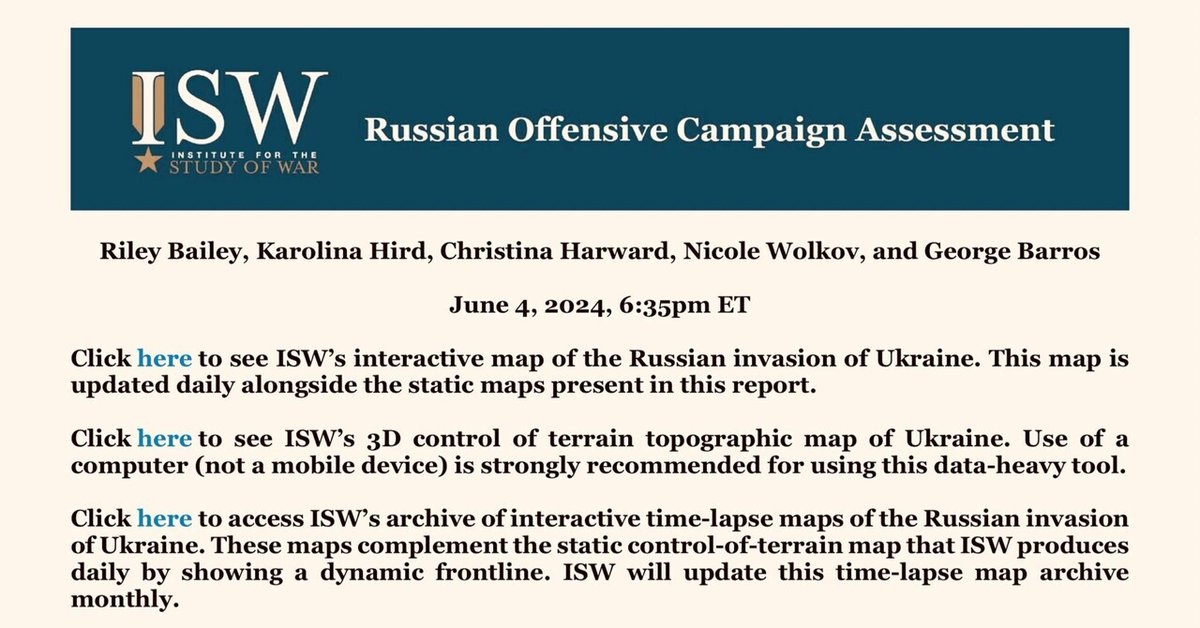
【抄訳】戦争研究所「ロシアによる攻勢戦役評価」2000 ET 04.06.2024 《ロシア軍事ブロガーのウクライナ軍ドローン戦能力評価》
Russian Offensive Campaign Assessment, June 4, 2024, ISW ⬇️
ロシア軍事ブロガーのウクライナ軍ドローン戦能力評価
戦争研究所(ISW)報告書の一部日本語訳
ロシアの軍事コメンテーターの一部は、戦場でのドローン戦・電子戦(EW)能力においてウクライナ側が優越していることに関する不満を継続的に表明している。このことは、ウクライナの戦場を形づくっている戦術的・技術的イノベーションのサイクルが日進月歩の勢いで進んでいることを、引き続き明確に示している。今はロシア軍事ブロガーで、かつては「シュトルムZ」部隊訓練教官の任に就いていた人物が6月4日に、ウクライナ軍ドローンの撃退においてロシア軍が直面している難題を詳細に記した批判的内容のリストを投稿した。そして、ウクライナ軍が効果的かつ広範にドローンを使用していることが、今や、ロシア軍攻勢行動を撃退するウクライナ側能力の「主たる要素」になっていると主張した。この軍事ブロガーは、ロシア・ウクライナ間のドローン能力の不均衡に関して、6つの点を指摘した。まず最初に主張しているのは、一人称視点(FPV)ドローンとFPVドローン・オペレーターの点で、ウクライナ軍部隊が大きな数的優勢を得ているということだ。この軍事ブロガーの見解によると、ウクライナ軍攻撃部隊はロシア軍攻撃部隊と比べて、3対1~4対1の比率でFPVドローンの数的優勢を有しており、機械化部隊のFPVドローン数については、6対1~10対1の比率でウクライナ軍のほうがロシア軍よりも優勢であるとのことだ。ウクライナ軍がまた、既存の地上部隊内にドローンに特化した部隊を設けて、集中化していることも主張しており、それによって、ウクライナ軍は偵察型・攻撃型ドローンの能力を基本的な戦術行動のなかにうまく組み込むことができているとのことだ。それとは反対にロシア軍は、組織化して集中化したドローン部隊システムを有しておらず、ウクライナ軍ドローンに対抗するのに適当なEW能力と電子偵察(ER)能力を欠いている。シュトルムZ部隊の元訓練教官をこの議論に駆り立てることになった元々の投稿を5月31日に公開した別の軍事ブロガーは、アウジーウカ方面においてウクライナ軍のドローン特化部隊が、無防備なロシア軍装甲兵器を集中的に狙って破壊しており、この方面でのロシア軍攻勢の進展を阻害していると指摘した。この軍事ブロガーは、FPVドローンと必要とされるEW・ERシステムのロシア軍への供給が、「一時的で恒久性のない」有志ベースで行われていることを強調した。そうなっている理由に、ロシア国防省を起点とする中央集権化された供給体制が存在しないことをあげている。ロシアがドローン戦能力を中央集権的に取りまとめていく必要があるという上述の見解は、ロシア国内論評者のなかの中心的な人々が最近示している要求にもあらわれている。なお、このような人物のなかには、ロスコスモス社(旧ロシア宇宙局)の元社長ドミトリー・ロゴージンも含まれている。ウクライナ軍が適応し、新しい技術を自軍戦力にうまく組み込んでいるなか、戦場における技術的・戦術的均衡を保持するために、ロシア軍はウクライナ側と同じことをしなければならないという圧力を、ロシア軍が今後、感じることになる可能性は高い。この攻撃対防御と能力の拡大競争は、現代戦における戦闘手段の開発・発展の中心になっている。
報告書原文の日本語訳箇所(英文)
Select Russian military commentators continue to complain about superior Ukrainian drone and electronic warfare (EW) capabilities on the battlefield, continuing to highlight the rapid and constant tactical and technological innovation cycles that are shaping the battlespace in Ukraine. A Russian milblogger who formerly served as a "Storm-Z" unit instructor posted a list of complaints on June 4 detailing the challenges that Russian forces face in repelling Ukrainian drones and claimed that effective and pervasive Ukrainian drone use is now the "leading factor" in Ukraine's ability to repel Russian offensive actions. The milblogger made six points about the Russian-Ukrainian drone disparity, claiming first and foremost that Ukrainian troops have a large numerical advantage in first person view (FPV) drones and FPV drone operators. The milblogger claimed that Ukrainian assault groups have a 3-4:1 FPV drone advantage over Russian assault units, while Ukrainian mechanized groups have a 6-10:1 FPV drone advantage over comparable Russian units. The milblogger noted that Ukraine also has specialized and centralized drone units within existing Ukrainian ground units, which allows Ukrainian forces to better integrate reconnaissance and attack drone capabilities into basic tactical maneuvers. Russian forces, by contrast, lack the centralized and organized drone-unit system and adequate EW and electronic reconnaissance (ER) capabilities to counter Ukrainian drones. Another milblogger, whose initial post from May 31 spurred the former Storm-Z instructor to weigh in on the issue, noted that specialized Ukrainian drone units have heavily targeted and destroyed unprotected Russian armored equipment in the Avdiivka direction, inhibiting Russian offensive prospects in the area. The milblogger emphasized that the provision of FPV drones and required EW and ER systems to Russian forces is done on an ad hoc volunteer basis, as there is no centralized supply mechanism from the Russian Ministry of Defense (MoD). These remarks on Russia's need to centralize its drone warfare capabilities echo recent calls made by a cadre of Russian commentators, including former Russian Space Agency (Roscosmos) head Dmitry Rogozin. As Ukrainian forces adapt and better integrate new technologies into their force, Russian forces will likely feel pressured to do the same in order to retain technological and tactical parity on the battlefield. This offense-defense and capability scaling race is central to the development of combat means in a contemporary war.
この記事が気に入ったらサポートをしてみませんか?
